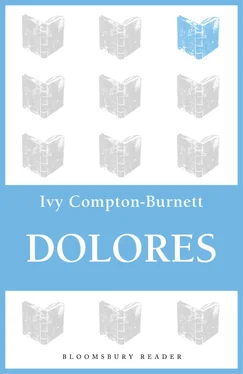Ivy Compton-Burnett - Dolores
Здесь есть возможность читать онлайн «Ivy Compton-Burnett - Dolores» весь текст электронной книги совершенно бесплатно (целиком полную версию без сокращений). В некоторых случаях можно слушать аудио, скачать через торрент в формате fb2 и присутствует краткое содержание. Год выпуска: 2013, Издательство: Bloomsbury Publishing, Жанр: Классическая проза, на английском языке. Описание произведения, (предисловие) а так же отзывы посетителей доступны на портале библиотеки ЛибКат.
- Название:Dolores
- Автор:
- Издательство:Bloomsbury Publishing
- Жанр:
- Год:2013
- ISBN:нет данных
- Рейтинг книги:3 / 5. Голосов: 1
-
Избранное:Добавить в избранное
- Отзывы:
-
Ваша оценка:
- 60
- 1
- 2
- 3
- 4
- 5
Dolores: краткое содержание, описание и аннотация
Предлагаем к чтению аннотацию, описание, краткое содержание или предисловие (зависит от того, что написал сам автор книги «Dolores»). Если вы не нашли необходимую информацию о книге — напишите в комментариях, мы постараемся отыскать её.
was published in 1911. It sold well, and was promptly forgotten. Now that her career of sixty years is ended, and her long achievement more and more acclaimed,
, standing at that remote beginning, is curiously reborn.
Dolores — читать онлайн бесплатно полную книгу (весь текст) целиком
Ниже представлен текст книги, разбитый по страницам. Система сохранения места последней прочитанной страницы, позволяет с удобством читать онлайн бесплатно книгу «Dolores», без необходимости каждый раз заново искать на чём Вы остановились. Поставьте закладку, и сможете в любой момент перейти на страницу, на которой закончили чтение.
Интервал:
Закладка:
Let us next observe the mourner behind Mr Blackwood, who is also broad-shouldered, and also one of the familiar figures of the neighbourhood’s gentry. That is Dr Cassell, the physician of the village and the district. On casting on him the first comprehensive glance of a stranger, you would hardly take him for a doctor. The indefinable air of the physician was wanting. His close-cropped hair and beard, his rubicund cheeks, and the general trend of his outward personality suggest the man of business. But he had as great a right to meet you on a physician’s standing as the most professional-looking of his brethren; for he was a physician not merely by virtue of choice and training, but by nature. As a boy of sixteen he had set a bone under the guidance of his instinct; and in the period to which he referred as “my commercial life”—in which, to divulge a fact which tended to escape himself, his influence on trade had been wielded indirectly through the faculties called into use by errands and accounts — his kindly amateur skill had won him some lasting gratitude. On his transition from commercial life to his present estate of prosperous country practitioner, though a part of his career as much as any other to his credit, he was not accustomed to dwell. His degrees were American; and his following of the text-books of an English medical course was marked by no pedantic devotion to the letter. His practical healing, it may be said, was not greatly less, that it was achieved under the direction of nature rather than of text-books.
But he was not a man to be carried away by modern tendency to narrowness; and medicine was not the only subject in which he felt interest. He delighted in gathering knowledge under any head; preferring it in promiscuous fragments complete in themselves, and adapted for retailing — a process in which his delight was keener. His ideas of knowledge, and the traits which marked his imbibing it, though it can hardly be claimed for him that they were peculiar to himself, were not those common amongst gentlemen with degrees. If he wished to connect some ideas with a well-known name, which to him was merely a name — and there were a good many well-known names standing to him in this which he naturally felt a somewhat bald relation — he would commit to memory some anecdotes of the owner’s history, in preference to perusing any part of his works. He never alluded to the fact that he did not read imaginative literature, perhaps hardly realised he did not read it; but he avoided it by instinct, as barren of material suited for transmission in pithy fragments, and hence in all senses barren. He was, in a word, a “self-educated man” in the fullest sense of that subtle term. He was regarded in Millfield as a person of infinitely broad information, capable of pouring forth erudition upon any subject at a moment’s notice — a view accepted without question by Mr Blackwood, but not accepted at all by the Reverend Cleveland Hutton; who had himself obtained a second-class in classics at Oxford, and who had once, in talking with his wife, gone so far as to observe that Cassell was an illiterate, canting fool.
The reason of the first of the epithets selected by Mr Hutton we have perhaps learnt enough of Dr Cassell to gather. The second leads us to consider him under a final head. He was a man whose personality had many sides; and in addition to his medical and encyclopaedic preeminence, he was the third of the trio of local religious leaders, of which the Reverend Cleveland Hutton and Mr Blackwood were the first and second. In the religious accommodation of the district he was not so fortunate as his colleagues; for he was neither a member of the Establishment nor of the Wesleyan body. What he was, it is a less simple matter to make clear; and resort must be had to his own account of his abstract experience. He was accustomed to begin from the point where, at the age of twenty — seven, he had been converted, and to pass to a stage at which he had become a Plymouth Brother. From this body, for some scruple of conscience upon which he was vague, he had later seceded, though he always retained a tenderness for it, referring to its members collectively as “the brethren”; and at the time when this story opens, he had reached, at the age of thirty — nine, the emancipated stage of holding worship with his wife in his dining-room. His religious attitude was simpler, and may be given with more exactness, than might be presumed from the trouble of meeting its needs. The teachings of the Bible, interpreted according to the letter and without the commentator’s aid, — he thought the tendency to put the word of man before that of divine revelation one of the gravest signs of the times, — formed the larger part; and the remainder consisted of an antipathy to Roman Catholicism. The doctor’s horror of Roman Catholicism is entitled to a word. It was not an everyday, easy horror. It had a subtlety and force of its own. Mohammedans, Buddhists, and worshippers of wood and stone were in his eyes simply mistaken races; obstinately mistaken perhaps, and inexplicably ungracious in their reception of evangelising offices; but nevertheless brother-men, unfortunate in knowledge and environment, and very fit objects for missionary effort. To members of the Romish Church his attitude was one of utter condemnation; which never faltered to the extent of weakly admitting reason in the place of dogmatism; and which extended to any truckling or pandering in the shape of over-broad views upon religious tolerance, or high ritual on the part of clergymen; and even caused him to look askance at the little gold cross which dangled on the waistcoat of the Reverend Cleveland Hutton. That his intercourse with Mr Hutton was confined to his medical capacity it is hardly needful to state; but there had been an occasion on which he felt urged to transcend the professional boundary, and send the latter an anonymous postcard — we must remember in judging him that his early experience had not been that which is usual to professional gentle men, — asking him what justification he had, even granted that he felt entire indifference on his own ultimate and infinite prospects, for extending this callousness to those of others.
Dr Cassell’s claim to be held a religious leader rested on his willingness — more exactly, perhaps, eagerness — to “speak” on religious subjects in the building in the field, whenever occasion demanded, or, with further concession to exactitude, permitted; to as large an audience as previous notices on its walls, and hints offered in person on professional rounds could gather. This leaning was a natural strain on his amity with Mr Blackwood; and might have put an end to it, had it rested on foundations whose undermining was possible. Happily it did not. Mr Blackwood and Dr Cassell stood in an indissoluble relation. Each was the other’s chief repository for his recurring effluence of thought and opinion. Each had the same views upon Roman Catholicism — though Mr Blackwood could not but regard his friend as somewhat lacking in the gift of charity in his attitude to definite persons of this persuasion;—and the same fondness for repeating them, and resignation in hearing them repeated. Moreover, Mr Blackwood found a revelling-ground for his controversial talents in the winning of Dr Cassell to enthusiasm for Temperance; for which the latter’s tolerant sympathy was prevented from taking a fervid form by the relation of wine to his personal habits. He also combated his tendency to be what he considered somewhat narrow and over-literal, and regardless of the bearing of the context in his interpretation of isolated texts — not that Mr Blackwood had leanings to the over-broad in such matters, or ever faltered in his position as regards the higher criticism. Dr Cassell on his part found his neighbour a faithful believer in himself as a qualified retailer of tit-bits of knowledge; appreciative of their interest, and never acquainted with them beforehand, and, if not an eager, a resigned and considerately responsive auditor of anecdotes.
Читать дальшеИнтервал:
Закладка:
Похожие книги на «Dolores»
Представляем Вашему вниманию похожие книги на «Dolores» списком для выбора. Мы отобрали схожую по названию и смыслу литературу в надежде предоставить читателям больше вариантов отыскать новые, интересные, ещё непрочитанные произведения.
Обсуждение, отзывы о книге «Dolores» и просто собственные мнения читателей. Оставьте ваши комментарии, напишите, что Вы думаете о произведении, его смысле или главных героях. Укажите что конкретно понравилось, а что нет, и почему Вы так считаете.












